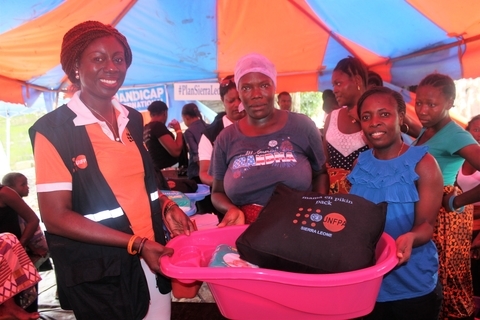FREETOWN, Sierra Leone – Imagine waking up one morning to hear that your entire family, including your children are dead. Spare a thought for Fatmata Turay and her husband who woke up to distressing news concerning the death of 19 of their family members who were washed away by the devastating floods and landslides which took place on the outskirts of Freetown, the capital of Sierra Leone.
Fatmata was found half-naked shouting, and crying bitterly and walking worriedly, by some community women in the middle of the Hill Station road, that overlooks the disaster site where her entire family and home was washed away. “Oh my children, my brothers, my sisters, oh my people, why?” Fatmata wept. Two of her children, aged eight and 12, four brothers, five sisters, nephews, aunts and uncles; all gone.
Fatmata and her husband survived the flooding because they spent the night at a new two-bedroom house they are constructing. “It was too late to return home. We had worked all day, broke stones and built blocks. We were tired, so my husband and I decided to sleep at the construction site,” she explained.
Fatmata who is five months pregnant explained that they could not identify some of the bodies of her family because the bodies were badly damaged. “We found a few body parts missing and other bodies we could not watch two times,” she added.
At the top of the Pentagon Camp in Lumley, West of Freetown where Fatmata and husband are currently living, the empty lot where Fatmata’s former house was located is clearly visible. “Every morning when I wake up, I can see the empty space which makes me just burst into tears,” she said.
Although Fatmata is five months’ pregnant, she had never been to a hospital or clinic for antenatal care. Tatiana Ro Coker, a nurse at the Faith Malama Community Health Post (CHP) in Lumley said, “Had it not been for the timely intervention of UNFPA Sierra Leone to support them with antenatal care, the chances of many of the women surviving and delivering normal births, would have been slim.” The temporary health was constructed to treat pregnant women and other survivors suffering from injuries and conditions. “Every morning when I wake up, I would rush to the tent to observe them. Some of them were complaining of migraines and are suffering from Edema - swollen feet and ankles,” she said. Nurse Coker commented that during the flooding and landslide it is possible that some of the women may have hit their stomachs on stones and sticks, which might have affected their babies; so this support from UNFPA ‘will help us to know the status of the fetus.'
Fatmata was one of the first set of registered pregnant women who received full antenatal screening and an ultrasound scan at the Plan Parenthood Association Sierra Leone (PPASL), with support from UNFPA.

UNFPA is the lead UN agency for delivering a world where every pregnancy is wanted, every childbirth is safe and every young person’s potential is fulfilled. UNFPA reaches millions of women and young people in 155 countries and territories.
For more information, please contact:
Ms. Angelique Reid, Communications Specialist
UNFPA Sierra Leone
M: 078 340044

